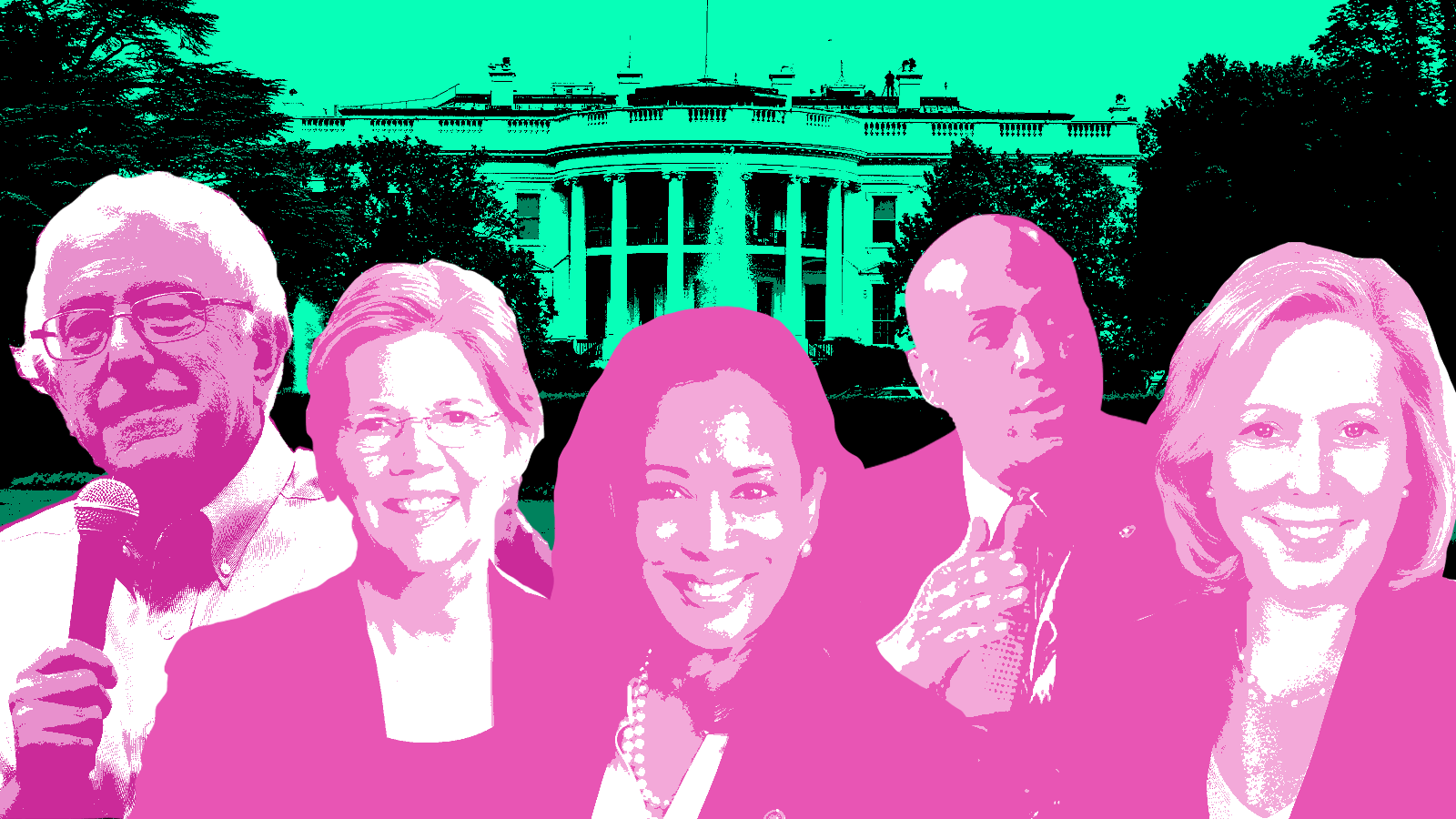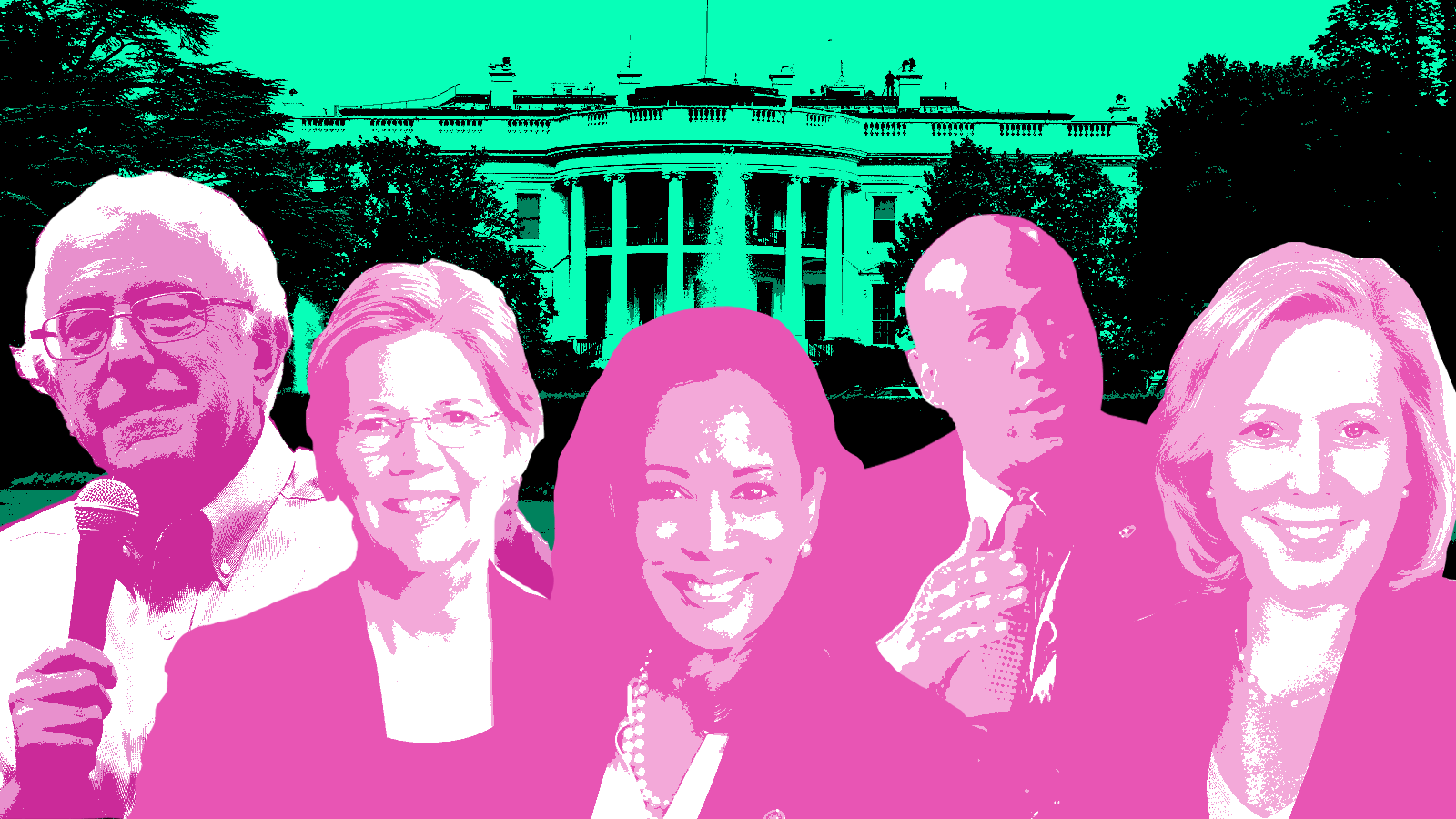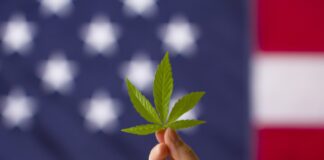
The relationship between marijuana and the highest office in the U.S. is an interesting one.
From the rumors of John F. Kennedy having smoked three joints in the White House and Bill Clinton’s unconvincing admission that he “didn’t inhale,” to George W. Bush telling Jay Leno that he “might’ve smoked something” and incredible photos of a young Barack Obama smoking weed, there seems to be somewhat of an inconsistency of what a president’s relationship to cannabis should be considering that it’s been federally illegal since the 1930s.
But that’s starting to look differently. Marijuana legalization has been sweeping through the United States, a couple of states at a time, leading some candidates to become more vocal about their views of marijuana’s place in law enforcement, medicine, and American culture. Cannabis arguably hasn’t had this kind of political focus since Richard Nixon’s presidency.
And while President Donald Trump’s inconsistent stance on cannabis policy could change with a tweet, look to social media to see what his Democratic challengers are saying about weed.
Sen. Bernie Sanders
Independent Vermont Sen. Bernie Sanders is officially running for president again. After an email announcement made on Feb. 18, 2019, to his supporters, Sanders laid out his policies, including universal health-care access, free college tuition, and ending the war on drugs.
We need to invest in jobs and education for our kids, not more jails and incarceration. We need to end the destructive “war on drugs,” eliminate private prisons and cash bail and bring about major police department reform.
— Bernie Sanders (@BernieSanders) February 21, 2019
Sanders has a long history of supporting policies and being vocal about decriminalizing and rescheduling cannabis. In January 2018, Sanders was critical of former Attorney General Jeff Sessions after he rolled back protections to states that legalized marijuana use implemented during Barack Obama’s presidency.
Instead of Attorney General Sessions intensifying the failed war on drugs, states should be allowed to make their own decisions regarding the legalization or decriminalization of marijuana. https://t.co/EpXfq5HxAT
— Bernie Sanders (@SenSanders) January 6, 2018
In January 2019, Sanders placed marijuana legalization in a list of “radical” ideas that he believes Americans would support, alongside a $15 minimum wage, regulating large banks, and the expansion of Social Security.
On nearly every “radical” idea the American people are with us:
72% want to expand Social Security.
70% want Medicare for All.
65% want a jobs guarantee.
64% want to legalize marijuana.
60% want tuition-free public colleges.
58% want $15 min wage.
57% want to break up big banks.— Bernie Sanders (@SenSanders) January 15, 2019
Sen. Elizabeth Warren
Democratic Massachusetts Sen. Elizabeth Warren is also making a presidential run. Since making her announcement on Feb. 9, 2019, Warren has continued to be a fierce critic of Wall Street and serious proponent of ending the opioid epidemic. She’s also spoken about the possibility of medical cannabis being an alternative to opioid-based pain treatments.
Medical marijuana might be a viable alternative to opioids for pain treatment, but truthfully, there’s a lot we just don’t know.
— Elizabeth Warren (@SenWarren) February 25, 2016
Throughout Trump’s presidency, Warren has also been critical of Trump’s lack of commitment to protect states that have legalized the use of cannabis. She filed a bill that would ensure that the federal government would not interfere with marijuana-legal states.
It’s time to reform American’s outdated marijuana policies. Watch live as @SenCoryGarder and I discuss our new legislation that would let states, territories, & tribes decide for themselves how best to regulate marijuana – without federal interference. https://t.co/BVcvxomhld
— Elizabeth Warren (@SenWarren) June 7, 2018
Sen. Kamala Harris
Democratic California Sen. Kamala Harris joined the presidential race and bid for the party’s nomination on Jan. 27, announcing her run on ABC’s “Good Morning America.” Harris served as California Attorney General and San Francisco District Attorney before becoming the second African-American woman to serve in the Senate, where she’s been a supporter of policies such as expanded health-care access, affordable housing, and marijuana legalization and decriminalization.
Decriminalizing marijuana at the federal level isn’t just a smart thing to do —it’s the right thing to do. We can’t keep repeating the same mistakes of the past. Too many lives have been ruined by these regressive policies.
— Kamala Harris (@KamalaHarris) December 11, 2018
Harris became involved in a cannabis-related controversy, referred to as “Reefergater” or “SnoopGate” in social media. During a Feb. 11, 2019, appearance on “The Breakfast Club” radio program, her comments were interpreted to mean she smoked cannabis during college while listening to the music of Snoop Dogg and 2Pac, to which social media users pointed out that both artists hadn’t released music by the time Harris had graduated from college. Both “The Breakfast Club” hosts defended Harris, and Vice’s senior politics editor, Harry Cheadle, dismissed the scandal as the “the dumbest story of the year.”
Who cares what Kamala Harris listened to while she did or did not smoke weed. What I care about is her record regarding marijuana legalization. That is what we should be talking about—her policy record!
— Nikkita Oliver (@NikkitaOliver) February 13, 2019
Sen. Cory Booker
Democratic New Jersey Sen. Cory Booker jumped into the 2020 presidential race on Feb. 1. Booker has been extremely vocal about criminal justice reform and marijuana legalization, addressing both issues in his first radio interview after announcing that he would run for president.
In August 2017, Booker announced his introduction to the Marijuana Justice Act in a live Facebook video, in which he said that “the failed war on drugs has locked up millions of nonviolent drug offenders — especially for marijuana-related offense — at an incredible cost of lost human potential, torn-apart families and communities, and taxpayer dollars.”
Booker’s legislation has been supported by Sens. Sanders, Harris, and Kirsten Gillibrand of New York. Booker and Sanders discussed the effects of the war on drugs on low-income individuals and people of color, also during a live Facebook video.
Sen. Kirsten Gillibrand
Democratic New York Sen. Kirsten Gillibrand is also vying for the party’s presidential nomination, announcing her candidacy on Jan. 15, during an appearance on Stephen Colbert’s “The Late Show.” Gillibrand has been pushing policies such as expanded health-care access and universal paid family leave, and challenging the culture of sexual harassment and assault in politics and the military, all while advocating for more women in politics. She’s also been critical of the pharmaceutical industry for opposing the legalization of marijuana.
Big pharma keeps pushing back against legalizing medical marijuana because, in many cases, they want to continue to sell addictive drugs and dominate the market for drugs that address chronic pain. That’s wrong.
It is time to rework our cannabis laws. https://t.co/g23trjnJcT
— Kirsten Gillibrand (@SenGillibrand) February 28, 2018
Like Sanders and Harris, Gillibrand co-sponsored Booker’s Marijuana Justice Act, announcing her support on a live Facebook video with Booker when they discussed reforming the criminal justice system through marijuana legalization.
Sen. Amy Klobuchar
Democratic Minnesota Sen. Amy Klobuchar joined the crowded Democratic field on Feb. 10. The longtime senator’s reputation is one of a tough pragmatist who wins her elections by huge margins, according to Vox.com. Her candidacy has kicked off with calls for regulating the technology sector and marijuana legalization.
UPDATE from @amyklobuchar: “I support the legalization of marijuana and believe that states should have the right to determine the best approach to marijuana within their borders.” https://t.co/MxAi9XOUwz
— Jackie Alemany (@JaxAlemany) February 22, 2019
Unlike Gillibrand, Harris, and Sanders, Klobuchar hasn’t signed onto Booker’s Marijuana Justice Act.
Featured Illustration: Photos of a selection Democratic 2020 presidential candidates have been altered from photos available on Flickr and used under a Creative Commons Attribution 2.0 Generic license.











